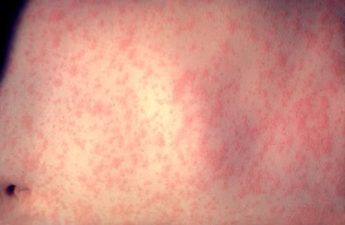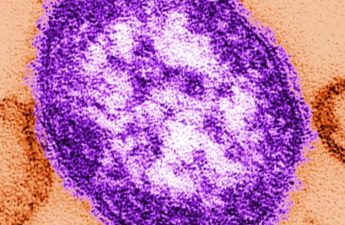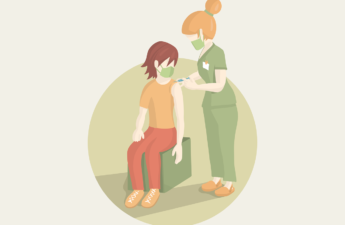How to avoid missing school or work if you’re exposed to the measles

By Meredith Li-Vollmer, Public Health – Seattle & King County
We’re continuing to see cases of measles cases in King County and with that comes the potential for others to come into contact with the measles virus without knowing it. People can be infectious with measles before they know they have it, so some people with measles may be in public places exposing others to the virus. Recent places of exposure include the airport, retail locations, restaurants, workplaces, healthcare settings, and schools.
When there’s a measles exposure in a public location, measures have to be put in place to prevent an outbreak, and that has consequences for people who were present at the time and place of exposure. Showing evidence of measles immunity is needed to be able to attend childcare, school, and work.
We want you to know what counts as evidence of measles immunity so you can get your documentation before you are ever exposed to measles. And in taking these steps, you’ll also make sure you and your family members are well protected from measles. We don’t want anyone to miss a day of childcare, school, work, or recreation because they were in the wrong place at the wrong time.
We sat down with Dr. Jeff Duchin, Health Officer for Public Health – Seattle & King County, to understand what happens when there is a measles exposure and what people can do now to make sure they won’t have to stay home if they get exposed.
Dr. Duchin, if you are exposed to measles, what’s the concern?
Measles is one of the most contagious viruses with the ability to hang in the air for up to two hours after someone with the measles has passed through a space. Anyone who does not have immunity could become infected with measles from an exposure and could spread it to others, even before they feel sick. Measles can lead to serious health problems in some people, like pneumonia, miscarriages, or swelling of the brain so it’s critical to prevent it from spreading to more people in more places.
If you are exposed to measles, you will need to know whether you are immune to measles (from vaccination or natural infection) and be able to provide documentation of your immunity promptly to public health staff to avoid the need to stay home and away from others. [JD1] [JD2] If you have the documentation, you can go to school, childcare, work and other public places as usual. Anyone who does not have documentation of immunity to measles needs to stay home and away from public places from 7 days after the first exposure until 21 days after the last exposure to prevent the virus from spreading.
Why do you need to stay home for 21 days if you are exposed to measles? That seems like a long time.
The measles virus could develop inside the body for as long as 21 days after an exposure, so if you aren’t immune to measles we need to make sure you’re out of this incubation period before you can be out in public. We recognize the burden this puts on people, but it is necessary to protect the health of the community, especially those who may be more vulnerable to measles, such as young children, pregnant women, and anyone with a weakened immune system.
So how can I show documentation of immunity if needed?
You can provide written documentation showing that you were immune to measles before you were exposed from any of the following:
- You were born before 1957
- Record of measles, mumps and rubella (MMR) vaccination (one dose for children ages 1-3, 2 doses for children age 4 and over, 1 dose for most adults*)
- A lab test that shows you have measles immunity (either from prior vaccination or natural infection).
*Healthcare providers, international travelers, and students need two doses of MMR vaccine. Also, measles doses administered between 1963-67 are considered invalid; if you were vaccinated in those years, get another vaccination.
That means I need to have written records. What if I don’t have any written records?
Many adults don’t have their childhood vaccination records. You have a few options:
- If you were vaccinated in Washington, you can look up your family’s vaccination records on their website.
- You can get a MMR vaccination before you get exposed to measles and keep the record. It’s safe to get an additional MMR even if you’ve already been vaccinated. There are low cost and even free places to get MMR vaccinations locally.
- If you think you’ve been vaccinated or had measles in the past, you can get a blood test from a healthcare provider that shows immunity. This could cost more than a vaccination. Again, make sure to keep the documentation.
Can’t I just wait to get an MMR vaccination if I find out I’ve been exposed?
No, unfortunately we can’t accept documentation of vaccinations given afteryou’ve already been exposed because you may already be infected at the time of vaccination. However, if you do get vaccinated after an exposure, you would be protected from future exposures.
What if I can’t find my documentation right away?
If you get exposed to measles, you’ll need to stay home until you can provide documentation that you are immune. Measles cases will continue to occur in our community, across the United States and internationally. I recommend getting vaccinated with MMR if you’re not up to date, and everyone should have their documentation in place now so you won’t have to miss any time from work or school if you are at a place where someone with measles has recently passed through.
More information about measles and measles vaccine


